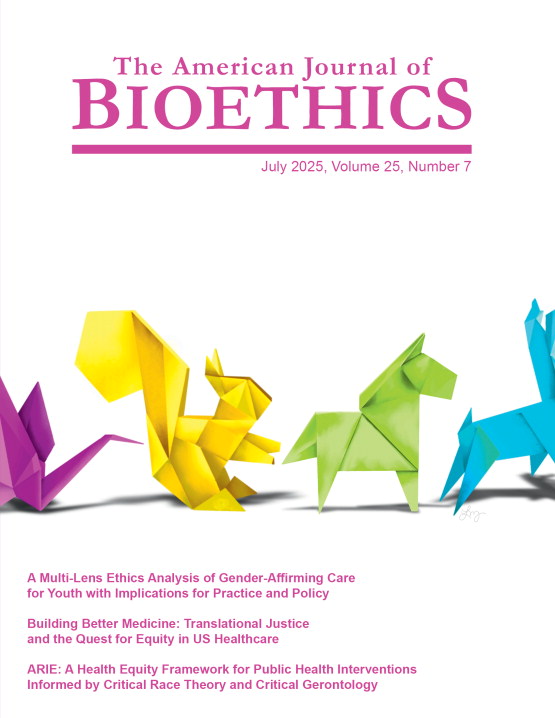
This editorial appears in the July 2025 issue of the American Journal of Bioethics
In June 2021, Dr. Kyle Merritt made international news when he admitted a female septuagenarian to a hospital in British Columbia, charting her chief complaint as dehydration and exacerbated asthma due to climate change. A diagnosis of “climate change” is unconventional, but it elevated the question of how clinical medicine can or should react to the rising threat of climate change.
This is unlikely to be the last climate change-induced diagnosis. The ecological impact of rising average temperatures threatens the health and well-being of all life on this planet, including the human population that is causing it. Climate change should clearly be considered a bioethics issue as it affects our wellbeing, our access to health care, and how we make health and health care decisions. It also intersects with bioethics’ commitment to justice and public health, affecting all parts of human health, but not impacting all humans equally. People in the global south, people with low incomes in high-income countries, children, chronically ill people, and racialized minorities are disproportionately affected by climate changes, whether it is their health or their ability to financially recover from the devastation of events like wildfires or hurricanes. As the symptoms and impacts of our changing climate become more evident in the clinical setting, it is clear that climate consciousness should become a more essential part of clinical medical ethics. It is time to acknowledge Hantel, Marron, and Abel’s claim that “the environment is intimately connected to clinical medicine.”
Some may argue that it is difficult to determine whether something so massive and dispersive as climate change should fall within the scope of clinical medical ethics work. Clinical ethics consultants, in particular, frequently wrestle with questions concerning their scope of practice in clinical settings in which they are often undervalued and/or overburdened with high caseloads and competing priorities. Many ethical issues that influence clinical decision-making, equitable treatment, and safe discharge options are systemic and permeate outside the walls of the hospital, making them difficult to address during an acute episode of care. Clinical ethics is already grappling with how to address other social determinants of health, such as racism, trauma, gun violence, and an inadequate social safety net, economic disparities, inequitable access to care, and other issues. Does adding climate consciousness to the list mean that we are adding another impossible social juggernaut to the growing list of concerns that burned out, overworked, emotionally depleted clinical ethicists and clinicians must now also address in their work?
Since clinical medical ethics concerns the whole person, this invariably means acknowledging the broader social, economic, and ecological forces that impact patients’ lives. The question of whether the field of clinical ethics ought to address climate change is, therefore, a clear and resounding yes, given the interconnectedness of health and the environment. It is also a clear yes, given that climate change causes harm that will disproportionately be borne by the most vulnerable regions and populations. Given these issues, the ethical obligations of non-maleficence, beneficence, and justice alone compel ethical intervention.
Now might just be the perfect opportunity to introduce the concept of climate consciousness into a field that is pushing to standardize, justify its value, and define its scope. In fact, climate consciousness may fall in line with new calls for clinical medical ethics to deepen, if not broaden, its perspective. For example, Elizabeth Lanphier and Uchenna Anani Lanphier and Anani proposed incorporating trauma-informed care into ethics consultation to address conflict and patient vulnerability resulting from past trauma and prevent retraumatization. Vo et al. argued for the clinical ethicist to take a more active role in addressing racism by modifying the 4-topic framework to better account for potential biases and structural issues that impact patient care and decision-making. Asking clinical ethics to be aware of climate change is another attempt to make clinical ethics more complete and applicable to the current issues facing our health.
Even if we say that there is a moral responsibility to incorporate climate consciousness into clinical medical ethics, there remains the question of whether it is feasible or even possible to address climate change in the clinical setting—the “ought implies can” consideration. Unfortunately, many real-world constraints may hinder climate-conscious clinical medical ethics practices. The culture of American individualism, the current political environment, and the medical industrial complex based on market-based principles prioritize short-term economic interests that are often contrary to climate-conscious concerns. These social and economic norms influence the structure, education, and culture of medical practice and even clinical medical ethics. Current medical training focuses on patient physiology and often fails to consider the holistic context of patients’ lives, much less the environment in which patients live. Even clinical medical ethics practices may be hard to change, since they often conform to established clinical norms and social conventions.
These challenges don’t mean that the system cannot adjust, but rather that we need to acknowledge the high stakes of climate change to overcome our current inertia. It may require a rethinking of how we can provide clinical care in a humanistic and environmentally sustainable way. We will need more research, new training techniques, and new policies. New decision-making frameworks, such as the one proposed by Hantel, Marron, and Abel can help clinicians, ethicists, and patients to factor environmental into treatment decisions. Ethics committees may also be able to champion hospital policies that reduce energy waste. Climate-conscious clinical medical ethics may actually give us a grassroots way to step back and ask broader questions about the field such as what is an ethical way to view and treat patients, how far can we broaden the purview of clinical ethics given the impact our preclinical lives have on our health, how should we challenge the current systems that influence our health, and what are we, as ethicists, willing to do different to meet this issue of justice.